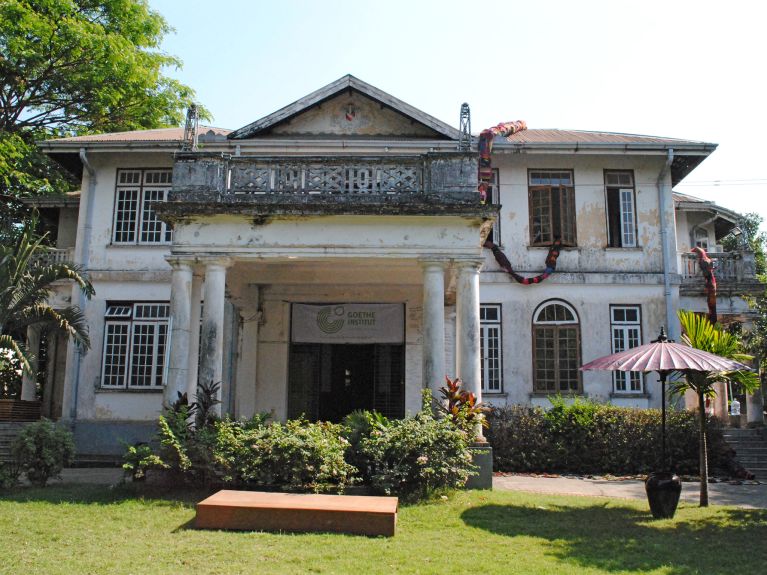“A truly open building”
The historical building housing the Goethe-Institut in Myanmar was elaborately renovated and has now been officially opened.

An official ceremony on the evening of 11 June 2018 marked the opening of the new premises of the Goethe-Institut in Yangon. Those attending included the Vice-President of the German Bundestag Thomas Oppermann, the President of the Goethe-Institut Klaus-Dieter Lehmann, the Minister for Education and Research of Myanmar, and the Chief Minister of Yangon Region. In the morning the villa was consecrated by monks from the nearby monastery. In conjunction with the opening there is an extensive programme of exhibitions and concerts.
This building has every chance of becoming a unique place for creative exchange in Yangon
On the occasion of the opening, Thomas Oppermann said: “In the past few years Myanmar has undertaken reforms and embarked on a path to democracy. The Federal Government and the Bundestag are doing their utmost to support Myanmar in this opening-up process. Nothing counters hate, war, and violence better than openness, education, and culture.” Klaus-Dieter Lehmann was likewise delighted with the newly opened building: “This building has every chance of becoming a unique place for cultural learning and creative exchange in Yangon, a really open house, where soon hundreds of people of all ages, but particularly young people, will be going in and out, learning our language, finding out about Germany at first hand, discussing the country’s concerns in an environment where there is no censorship, and sensitising society to peaceful coexistence.”
The Goethe-Institut in Myanmar has a long history
There was a Goethe-Institut in Myanmar as long ago as 1959. It was the first to be founded in Southeast Asia but had to close again as early as 1962, a few months after the putsch by General Ne Win. Following the beginning of the reforms and the gradual opening-up of the country, Germany was the first country to sign a cultural agreement with Myanmar. This paved the way for the renewed founding of an Institute, which opened in 2014 and was initially only housed in makeshift premises.

The biggest construction project
The old villa, which the Ministry of Culture offered the Goethe-Institut for long-term rent, has great symbolic value, having served as the headquarters of Aung San’s independence movement immediately after the end of the Second World War. In its spacious salons the demands on the British colonial power were discussed and the fundamentals of the future constitution drawn up. Renovating the historical building in line with guidelines for monuments and adding a state-of-the-art extension with a library and auditorium turned out to be one of the Federal Foreign Office’s biggest cultural construction projects of recent years and as such a clear signal to the young democracy in Myanmar of German foreign cultural and education policy.
Opening with cultural programme
In the week after the opening there will be a varied cultural programme. It will include exhibitions of works by artists from Myanmar and Germany, a club night with DJs from Berlin and two concerts accompanying the only surviving silent film from Myanmar, “The Emerald Jungle” from 1934, which was restored two years ago with funds from, among others, the Federal Foreign Office. It was added to the UNESCO World Cultural Heritage list only a few days ago. The original music will be played by traditional Myanmar drummers and Jazz musicians from Berlin.
